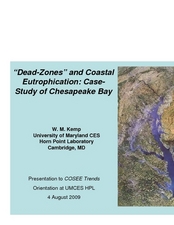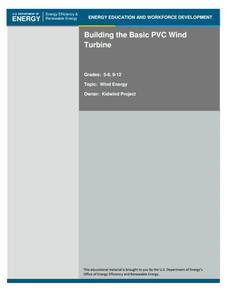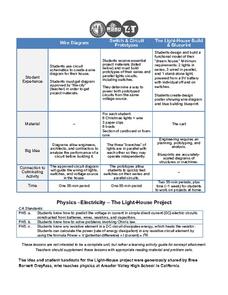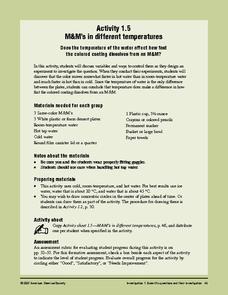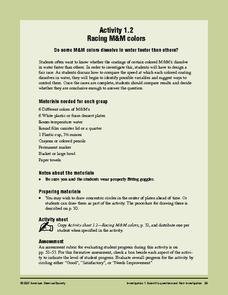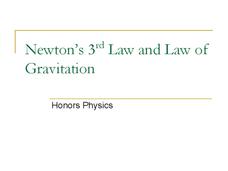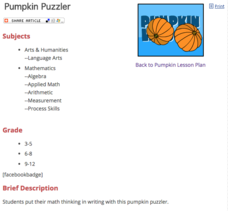Curated OER
Build A Borneo Glider!
Learners construct a paper glider. In this physics of gliding lesson, students first learn about Borneo and it's rainforest habitat. After learners discover the way animals in Borneo glide from tree to tree, they use their newly acquired...
Curated OER
Create a Cloud in a Bottle
Meteorology or earth science classes reach for the sky with this lesson plan! You will need to purchase a Fizz Keeper® device and temperature strip for each lab group if you want them to perform this as an activity rather than you doing...
Curated OER
2011 Nobel Prize Winners Announced
This assignment has young scientists read four different news articles about the 2011 Nobel Prize winners. Six questions are posed for children to write the answers. It is a relevant activity for getting middle schoolers to meet the...
Curated OER
"Dead-Zones" and Coastal Eutrophication: Case-Study of Chesapeake Bay
Take an in-depth look at nutrient loading, eutrophication, and hypoxia using data on The Chesapeake Bay as an example. This comprehensive presentation includes detailed graphs, photos, and details about the changes in marine organism...
US Department of Energy
Building the Basic PVC Wind Turbine
Here is a comprehensive and well-written lesson plan that results in learners building a standard wind turbine. Once built, teens can design a variety of experiments to test different factors. This activity is a noble undertaking that...
Curated OER
Insects?
Can you tell the difference between a bug and an insect? Aren't they the exact same thing? Let your learners explore, identify, classify, and document the differences they see in bugs and insects. The activity sheet suggests several...
Curated OER
Insects A-Z!
Alphabet insects! Who has ever heard of such a thing? Get ready because your class is going to research insects that start with a specific letter of the alphabet. In small groups, they'll use the Internet and reference texts to locate...
Foundation for Water & Energy Education
How is Flowing Water an Energy Source? Activity C
Can the force of falling water through a tube vary by altering the diameter of the tube or its height? That is what physical scientists aim to discover in this activity, the third in successively more revealing activities on the power of...
Trash For Teaching
The Light-House Project
Groups work together to design a lighthouse, from designing and drawing the wiring diagram, to creating prototypes of the switch and circuit, to envisioning and building a scale model along with a blueprint. By including different...
American Chemical Society
M&M's in Different Temperatures
Help your class come up with a procedure for comparing the dissolving rates of colored candy coating in different temperatures of water. If you are placing importance on controlled variables with your class, make sure that they use equal...
American Chemical Society
Racing M&M Colors
More than anything, this is great practice in scientific inquiry. After discovering that the color coating of an M&M® dissolves in water during a preceding activity, investigators now question whether or not the color makes a...
SFPOnline
States of Matter Worksheet
Young scientists get to the heart of the matter as they complete this worksheet on the properties of solids, liquids, and gases.
KOG Ranger Program
Fire Behavior in Forests
Understanding the ways a fire will act is a key factor in fire safety and fire prevention. Young campers focus on how the weather and terrain can affect the behavior of a fire with topographic maps and different scenarios.
Bowels Physics
Newton's Third Law and Law of Gravitation
Why was Sir Newton so important to the field of science? Pupils discuss his contributions, specifically his Third Law, as they learn about gravity and the center of mass. They work multiple problems to ensure their understanding and...
NOAA
Tides
Low tides, high tides, spring tides, neap tides, diurnal tides, semidiurnal tides, mixed tides ... just how many types of tides are there? The 10th installment of a 23-part NOAA Enrichment in Marine sciences and Oceanography (NEMO)...
Massachusetts Institute of Technology
List of Chemicals in Space
What is space made of? It turns out that there are many compounds found in space! The 10th lesson of a science series provides a list of the compounds found in space and asks young scholars to research the characteristics of these...
Colorado State University
Why Are Compact Fluorescent Bulbs More Efficient?
Compact fluorescent bulbs are the easiest way to increase energy efficiency around the house. But why? Science scholars compare CF bulbs with their incandescent counterparts using a simple test. A solar-powered toy illuminates the...
Education World
Pumpkin Puzzler
Light the Halloween festivities with an exercise that connects math, physical science, and language arts. After watching a demonstration of a burning candle, learners use division, multiplication, or algebra to determine how many boxes...
K12 Reader
What Causes Reflections?
Your kids probably use mirrors every day, but do they know how they work? A reading passage about reflection and reflective objects can address both physical science and reading comprehension. Kids read the paragraphs and use context...
Indiana Department of Education
Amusement of the Future
Take your class on the ride of their lives! Physical science scholars get an in-depth look at potential and kinetic energies in an amusement park-themed unit. Students research, design, and promote their own amusement parks, complete...
University of Houston
The Snow Queen Study Guide
Even the kindest friends can become selfish and tyrannical in Hans Christian Andersen's "The Snow Queen." Class members complete story-themed exercises in language arts, social studies, and even physical science.
Science 4 Inquiry
An Investigative Look at Florida's Sinkholes
In May of 1981, the Winter Park Sinkhole in Florida first appeared and is now referred to as Lake Rose. Scholars learn about the causes of sinkholes through an inquiry project. Then, they analyze recent data and draw conclusions to...
American Chemical Society
Using Color to See How Liquids Combine
Blue-tinted water is added to unknown liquids that have been tinted yellow to find out how they interact. This is a memorable activity that is part of an investigation on the properties of liquids, which is part of a unit on the...
Oceanic Research Group
Heat Transfer and Cooling
Astronauts train underwater to simulate the change in gravity. An out-of-this-world unit includes three hands-on activities, one teacher demonstration, and a discussion related to some of the challenges astronauts face. Scholars apply...





